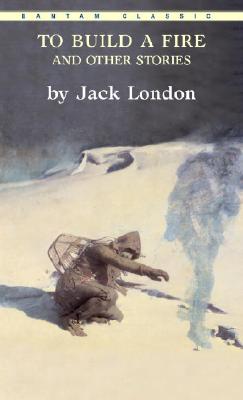Our book choice for July 2010 is To Build a Fire by Jack London, and other short stories. A man travels in the Yukon (in Alaska) on an extremely cold morning with a husky wolf-dog. The cold does not faze the man, a newcomer to the Yukon, who plans to meet his friends by six o’clock at an old claim.
As it grows colder, he realizes his unprotected cheekbones will freeze, but he does not pay it much attention. He walks along a creek trail, mindful of the dangerous, concealed springs; even getting wet feet on such a cold day is extremely dangerous. He stops for lunch and builds a fire.
The man continues on and, in a seemingly safe spot, falls through the snow and wets himself up to his shins. He curses his luck; starting a fire and drying his foot-gear will delay him at least an hour. His feet and fingers are numb, but he starts the fire. He remembers the old-timer from Sulphur Creek who had warned him that no man should travel in the Klondike alone when the temperature was fifty degrees below zero.
The man unties his icy moccasins, but before he can cut the frozen strings on them, clumps of snow from the spruce tree above fall down and snuff out the fire. Though building a fire in the open would have been wiser, it had been easier for the man to take twigs from the spruce tree and drop them directly below on to the fire. Each time he pulled a twig, he had slightly agitated the tree until, at this point, a bough high up had capsized its load of snow. It capsized lower boughs in turn until a small avalanche had blotted out the fire.
The man is scared, and sets himself to building a new fire, aware that he is already going to lose a few toes from frostbite. He gathers twigs and grasses. His fingers numb and nearly lifeless, he unsuccessfully attempts to light a match. He grabs all his matches–seventy–and lights them simultaneously, then sets fire to a piece of bark. He starts the fire, but in trying to protect it from pieces of moss, it soon goes out.
Other short stories read this month include:
- The Lottery by Shirley Jackson
- The Cask of Amontillado by Edgar Allan Poe
- The Purloined Letter by Edgar Allan Poe
- The Minister’s Black Veil by Nathaniel Hawthorne
- The Tell-Tale Heart by Edgar Allan Poe
To Build a Fire Discussion Questions
- Even today, stories of wilderness survival are extremely popular. Why do you think this is? What is it about wilderness survival that keeps audiences coming back for more?
- This story takes place around the year 1900. How might the story be different if it took place today? (Would the man just text his buddies at the camp to say, “I’m gonna B a little L8”?)
- The main character in this story seems to take a pretty easygoing attitude toward his dangerous situation. It’s not until things are really, really bad that he starts to panic. Would he have been better off if he’d panicked earlier, or was he right to remain calm for so long? Why?
- From what we can tell, the man in this story begins his journey knowing that he has more than nine hours of walking ahead of him.
- Why wouldn’t he just poke his head out the door and decide the day was too cold for traveling? Is it believable that he didn’t really notice how cold it was until he’d gone too far to turn back?
- The narrator of this story makes sure to say, “there was no keen intimacy between the dog and the man” (15). How does this comment play out in the story? How would you characterize the man’s relationship to the dog, and what does it suggest about London’s general view of humans and animals? How might the story have been different if there were keen intimacy between the guy and his canine?
- How can we read “To Build a Fire” as a cautionary tale? What lesson can we take away from it that’s relevant beyond the story’s Yukon setting?
- When you picture the main character of this story, what age do you think he is? The narrator is somewhat vague on this; but judging by the descriptions the story gives you, how old do you think the man is? Why might that matter?
- What do today’s stories about perseverance and survival (i.e. The Hunger Games) have in common with London’s story? How are they different?

